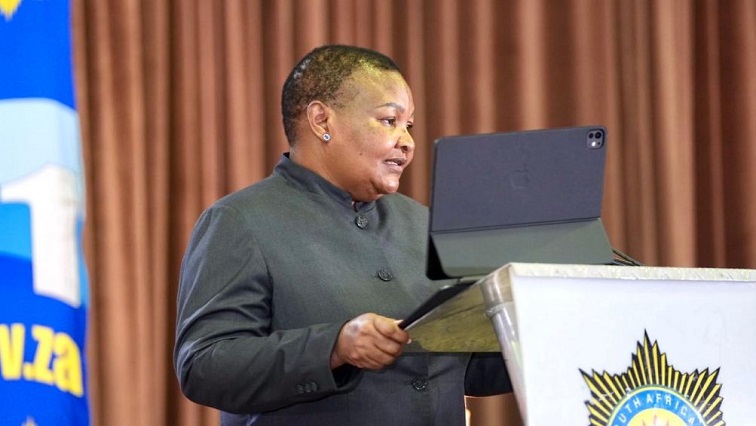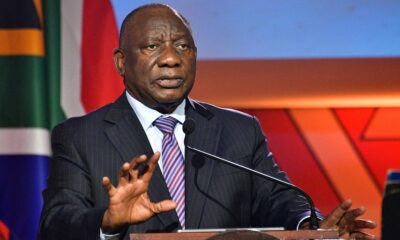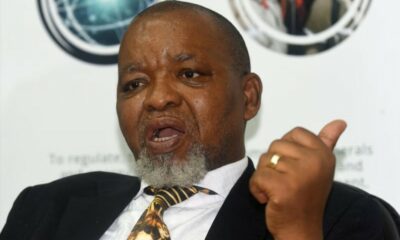News
Why Has President Ramaphosa Sidestepped Deputy Police Minister Polly Boshielo Amid Ministry Turmoil?

As chaos ripples through South Africa’s police ministry following explosive allegations against top officials, President Cyril Ramaphosa’s choice to appoint Gwede Mantashe, the Minister of Mineral Resources, as acting Police Minister has raised eyebrows, especially since Deputy Police Minister Polly Boshielo was notably left out of the running.
This decision is more than a simple reshuffle; it spotlights ongoing questions about the actual role and usefulness of deputy ministers in South Africa’s expansive and costly Cabinet.
Presidential Prerogative or Political Statement?
The Presidency was quick to defend the move as a constitutional prerogative exclusive to the President, with spokesperson Vincent Magwenya reminding the public that there is no fixed “template” for such appointments.
“The constitution grants the president the prerogative to appoint members of the national executive,” Magwenya told The Citizen, sidestepping why Boshielo was overlooked despite her current role as Deputy Police Minister.
Boshielo Speaks: Legal Limits on Deputies Acting Up
In a rare moment addressing the controversy directly, Boshielo herself acknowledged that acting minister roles cannot legally be filled by deputy ministers unless there is a formal Cabinet reshuffle.
“In terms of the law, the deputy minister can’t be appointed as the acting minister, only if, let’s say, there is a reshuffle,” she told SAfm.
While the Deputy Minister expressed willingness to work with the incoming acting minister Firoz Cachalia, she admitted the turmoil has taken a toll on staff morale within the ministry.
The Backdrop: A Ministry in Crisis
This leadership shuffle comes in the wake of dramatic allegations made by KwaZulu-Natal Police Commissioner Lieutenant General Nhlanhla Mkhwanazi, which have sent shockwaves through the security cluster and intensified scrutiny on the police ministry’s leadership.
Until Cachalia officially takes over on August 1, Mantashe will juggle dual roles — Mineral Resources Minister by day, Acting Police Minister by necessity — further complicating the already stretched government apparatus.
Costly Cabinet and Calls for Reform
The sidelining of a deputy minister also highlights a larger conversation about the efficiency and expense of South Africa’s Cabinet. When President Ramaphosa expanded his Cabinet last year to accommodate coalition partners, he added several deputy minister posts, swelling government payrolls at a time when many South Africans are feeling the squeeze.
Opposition parties like ActionSA have been vocal, proposing a Cabinet amendment bill aimed at scrapping deputy minister roles entirely, a move they claim could save the country R1.5 billion annually.
ActionSA parliamentary leader Athol Trollip remarked:
“The president must seize this moment, right-size the Cabinet and restore effective governance. This Cabinet is not only one of the largest in the world but also deeply ineffective, with worsening socio-economic indicators reflecting a failure rooted in absent reforms.”
What This Means for South Africa’s Police Ministry
As the police ministry wrestles with scandal and transition, the question lingers: does the current Cabinet structure genuinely serve governance or simply inflate bureaucracy?
For now, Deputy Minister Boshielo remains in her position but out of the acting spotlight, a symptom of larger institutional issues where roles, responsibilities, and political calculus often collide.
South Africans will be watching closely as Firoz Cachalia steps in, hoping for steady leadership in one of the country’s most critical portfolios.
In a country grappling with crime, political infighting, and governance challenges, decisions around who leads key ministries matter deeply. The President’s choices send ripples far beyond Cabinet meetings, impacting public trust and the effectiveness of state institutions.
Deputy ministers like Polly Boshielo, with regional leadership experience and party credentials, may have ambitions to take the helm, but legal frameworks and political decisions have left her sidelined for now.
Whether this fuels further debate on Cabinet size and deputy roles or sparks reform remains to be seen. What’s clear is that South Africa’s government is at a crossroads and leadership clarity in critical ministries like police is urgently needed.
If you found this article insightful, share your thoughts on the future of South Africa’s Cabinet and police leadership on social media. Your voice matters in shaping governance reforms.
{Source: The Citizen}
Follow Joburg ETC on Facebook, Twitter , TikTok and Instagram
For more News in Johannesburg, visit joburgetc.com



























